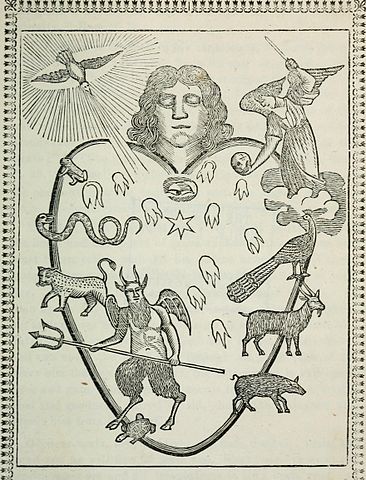The Captivating Power of Indwelling Sin

In chapter seven of Indwelling Sin in Believers, John Owen continues his reflections on the way indwelling sin exerted its enmity on the believer. Here he describes its captivating power and the madness that comes from its growth and success. He begins by citing Romans 7:23, where Paul said he sees a law waging war against the law of grace in his mind and making him captive to the law of sin. After quoting verse 24 (“Wretched man that I am! Who will deliver me from this body of death?”), he said he intended to declare what this meant.
Owen began by noting Paul said the soul was made captive to the law of sin, and not to any specific sin. For the most part, God gives believers grace so that they won’t be “made a prey” to any particular sin, so it will not have dominion over them. For if such a sin gained power over the individual, whether it was big or small, “it becomes in him in whom it is a sin of boldness, pride, and presumption.” The prevalency of sin within the soul is certainly from Satan, but it has “no peculiar footing nor advantage in the nature, constitution, or condition of the sinner.” And yet, if we succumb to the temptation of a particular sin, it will likely take advantage of something within our “natural constitution.”
When any lust grows high and prevailing more than others, upon its own account, it is from the peculiar advantage that it hath in the natural constitution, or the station or condition of the person in the world; for otherwise the law of sin gives an equal propensity unto all evil, an equal vigour unto every lust. When, therefore, it cannot be discerned that the captivating sin is peculiarly fixed in the nature of the sinner … the prevalency of it is peculiarly from Satan.
Owen said Paul was not describing in the Romans 7 passage how we are captivated by some specific sin, but rather the enslavement of the law of sin. “We are compelled to bear its presence and burden whether we will or no.” Sometimes an individual hopes and prays that they may be freed from a specific sin. And as the result of a gracious gift from God, people are sometimes actually freed from their captivity to a specific sin. They may even begin to hope they are freed from the law of sin, “but after a while see it is quite otherwise.”
Sin acts again, makes good its old station; and the soul finds that, whether it will or no, it must bear its yoke. This makes it sigh and cry out for deliverance.
Captivity is “misery and trouble,” said Owen; and no one willingly puts himself into that kind of trouble. He may choose its causes, the ways and means leading up to it, but not the captivity itself. “Whatever consent, then, the soul may give unto sin, which is the means of this captivity, it gives none to the captivity itself; that is against the will wholly.” This leads to the following.
The power of indwelling sin is great. We see this in how the will strives to be free from it. If the will faced no opposition from indwelling sin, or if the opposition was weak, then there would be no great evidence of its captivating power. But the persistent striving and resistance against the diligence, activity and watchfulness of the individual’s will is evidence of its power. The result is a variety of ways by which the soul is successfully held captive.
And there are several degrees of the success of the law of sin in the soul. Sometimes it carries the person unto outward actual sin, which is its utmost aim; sometimes it obtaineth the consent of the will, but is cast out by grace, and proceeds no farther; sometimes it wearies and entangles the soul, that it turns aside, as it were, and leaves contending,—which is a success also. One or more, or all of these, must be, where captivity takes place.
What could be a more wretched state than this condition? All captivity is dreadful, but its greatest aggravation stems from the condition of the tyrant to whom any one is enslaved. When the soul is graced with a loathing of sin, with a hatred of the least discrepancy between itself and the will of God, what could be worse than being held captive by this law of sin? This condition is then peculiar to believers.
Unregenerate men are not said to be led captive to the law of sin. They may, indeed, be led captive unto this or that particular sin or corruption,—that is, they may be forced to serve it against the power of their convictions. They are convinced of the evil of it,—an adulterer of his uncleanness, a drunkard of his abomination,—and make some resolutions, it may be, against it; but their lust is too hard for them, they cannot cease to sin, and so are made captives or slaves to this or that particular sin. But they cannot be said to be led captive to the law of sin, and that because they are willingly subject thereunto. It hath, as it were, a rightful dominion over them, and they oppose it not, but only when it hath irruptions to the disturbance of their consciences; and then the opposition they make unto it is not from their wills, but is the mere acting of an affrighted conscience and a convinced mind. They regard not the nature of sin, but its guilt and consequences. But to be brought into captivity is that which befalls a man against his will; which is all that shall be spoken unto this degree of the actings of the power of sin, manifesting itself in its success.
Lastly is the rage and madness that stems from the opposition of the law of sin to God and the law of his will. The Preacher said there is evil and madness in the human heart while we live (Ecclesiastes 9:3). This evil is the result of indwelling sin. It seems to consist of a violent, persistent pursuit of evil or sin. “It is the tearing and torturing of the soul by any sin to force its consent and to obtain satisfaction.”
It riseth up in the heart, is denied by the law of grace, and rebuked;—it returns and exerts its poison again; the soul is startled, casts it off;—it returns again with new violence and importunity; the soul cries out for help and deliverance, looks round about to all springs of gospel grace and relief, trembles at the furious assaults of sin, and casts itself into the arms of Christ for deliverance. And if it be not able to take that course, it is foiled and hurried up and down through the mire and filth of foolish imaginations, corrupt and noisome lusts, which rend and tear it, as if they would devour its whole spiritual life and power.
Ordinarily it does not rise up to these heights. “Though sin be always a fire in the bones, yet it flames not unless Satan come with his bellows to blow it up.” It is provoked and heightened by some great temptation, building upon some previous sin. Sin does not reach this height of madness at its first assault. “The great wisdom and security of the soul in dealing with indwelling sin is to put a violent stop unto its beginnings, its first motions and actings.” If it gains entrance to the soul and finds any reception, it gains strength and power.
The effects produced by this rage and madness include casting off—for a time—the yoke or rule of the government of the Spirit and the law of grace. Remember that where grace has dominion, it can never be fully dethroned. It will still keep its right and sovereignty, “but its influences may for a season be intercepted” by the power of sin. In this case, sin is like an untamed horse that casts off its rider and runs away. Owen then encouraged his readers to consider how this was done.
The seat and residence of grace is in the soul—the whole inner person—including the mind, will and affections. The whole person is a “new creature,” (2 Corinthians 5:17). “Its rule or dominion is the pursuit of its effectual working in all the faculties of the soul, as they are one united principle of moral and spiritual operations.” So then interrupting the rule or dominion of grace must consist of the faculties and affections of the soul acting contrary to how they act when they are ruled by grace.
Sin darkens the mind. It enflames the affections, “heated with the noisome lusts that have laid hold on them.” It weakens the will’s ability to obey the law of grace, and then renders it useless by “the continual solicitations of sin and temptation.” First the will lets go of its hold and debates whether it should yield or not; at last giving up to its adversary. It then takes away the power of self control, of considering the consequences of your actions.
And for the affections, commonly the beginning of this evil is in them. They cross one another, and torture the soul with their impetuous violence. By this way is the rule of the law of grace intercepted by the law of sin, even by imposing upon it in the whole seat of its government. When this is done, it is sad work that sin will make in the soul.
Turning to Paul’s exhortation in Romans 6:12, Owen warned his readers to not let sin reign in their bodies, to make them obey its lusts. Be careful to not let it get dominion over you even for a moment. The rage and madness of sin neutralizes your self-control, your ability to consider the consequences of what you are about to do. Secretly resolved to accomplish their lusts, they despised what God could do for them, even though it costs them their souls. Thus is the captivating power of indwelling sin.

